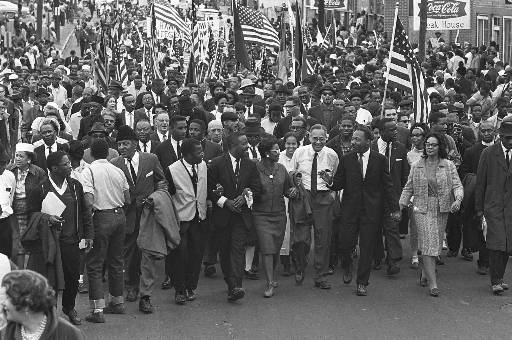The forlorn figures of Black History Month

Dr. Martin Luther King, third from right, marchers across the Alabama River on the first of a five day, 50 mile march to the state capitol at Montgomery, Ala., on March 21, 1965. (AP Photo)
The month of February is best known for two things, Valentine’s Day and Black History Month. However, the reasoning behind the one is rather simple, its purpose being love, both mutual and one-sided, whereas Black History Month has a much more complicated idea and one that is rather contradictory to its name.
As the name would suggest, Black History Month sounds like its focus should be the spread of knowledge on events of the past and how they have shaped the present. With the word “history” in the title one would think it would be about history, a month dedicated to the pivotal events and members of the African American community across the centuries of American history.
To some extent this is true. Schools during February do attempt to educate students about some important black individuals. However, it cannot be said that these attempts are anything scholastic. Instead of teaching about the larger picture of African American history, districts celebrating the month choose rather to retell the stories of only a few selected individuals over and over: Martin Luther King Jr., Booker T. Washington, Rosa Parks, and George Washington Carver. An emphasis is placed on the more recent history of the Civil Rights era and beyond, forcing the vital events of Nat Turner’s rebellion, Underground Railroad, and the Abolitionist Movement to be secondary.
Though these events are covered in many social studies classes, as they should be, they are seemingly forgotten during the month of February. Why is this? The answer some provide is that the month is meant to celebrate African American accomplishments, rather than mourn their defeats. It is a righteous goal, albeit an odd one. After all, the time is called Black History Month, but picking and choosing which events to discuss is not history. Rather, it seems to describe propaganda.
In 2015, school districts in Texas were given books that focused on only positive aspects of the United States; the backlash earned national recognition. Teachers demonstrated that they would rather teach the truth instead of something that makes our ancestors look better. The argument for how we handle Black History Month should be no different. When we care only about what was good, we lose out on real history, what made us into what we are today. The fact that some African Americans could be remembered poorly makes them that much more important to cover.
Humanity’s story is not one filled with heroics and achievements. There are good people, and there are bad, the color of their skin does not change that. If Black History Month was created for the purpose of equality, then why are only the positive aspects discussed?
Schools seem to only focus on the 1960s and Civil Rights, hardly ever remembering the years before it. The slave trade, Cotton Gin, and either World War are glossed over in favor of reiterations about Martin Luther King’s march in Selma. While Civil Rights is a massively important time in our history as a nation, not all of Black History began there. Benjamin Banneker was a black man born in Baltimore, Maryland during the year 1731. He helped to create the plan for Washington D.C., our nation’s capital, though few Americans today even know his name. The other planner abandoned the project early, forcing Banneker to finish the plans on his own. Since he had nothing to do with Civil Rights, he is never spoken of during Black History Month.
February is also a time when there is an odd surge of African culture. True, many of America’s black communities have roots leading back to Africa, and it has been centuries since that time. For hundreds of years, there have been black people in the New World. Before we talk about the varying cultures of an entire continent, a continent that is far from our shores and very different from us to begin with, we should turn our eyes to domestic history.
Rather than educate those about Black History, schools choose rather to retell stories that people are all familiar with. With this approach, major parts of history are almost utterly forgotten. Stories that do not fit the build are lost, even though those individuals have been vastly influential to not only black culture, but American history in general.
In the future, we should focus more on our entire history, good and bad, not just the lives four people during the 1960s. History is what makes us into who we are today and is important for us to understand things in the modern world. With the name “Black History Month,” we should expect something about black American history, not foreign cultures or reiterations of the same stories.

